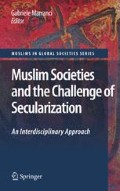Abstract
As elsewhere in Europe over the last decade Islam has become the dominant marker of identity attributed to Dutch citizens of Muslim descent. Besides 9/11 and the subsequent ‘war on terror’, several local incidents have influenced the dominant Dutch discourse on Islam. In 2002, it shook the nation when the liberal-rightist politician Pim Fortuyn, who spoke in very negative terms about Muslims, was killed. Even though the murderer was an environmentalist of Dutch background, Fortuyn’s death is often associated with the perceived danger posed by the presence of fundamentalist Muslims in the Netherlands.
Access this chapter
Tax calculation will be finalised at checkout
Purchases are for personal use only
References
Asad, T. (2004) Muslims as a “religious minority” in Europe, in T. Asad (ed.), Formations of the Secular. Christianity, Islam, Modernity, Stanford, CA: Stanford University Press, pp. 159–180.
Baumann, G. (2004) Grammars of identity/alterity; a structural approach, in G. Baumann and A. Gingrich (eds.), Grammars of Identity/Alterity. A Structural Approach, New York, NY: Berghahn Books, pp. 18–50.
Bennett, A. (2007) As young as you feel: Youth as a discursive construct, in P. Hodkinson and W. Deicke (eds.), Youth Cultures. Scenes, Subcultures and Tribes, London: Routledge, pp. 23–36.
Boubekeur, A. (2005) Cool and competitive, Muslim Culture in the West, isim Review 16: 12–13.
Bourqia, R. (ed.) (1999) Les jeunes et les valeurs religieuses, Casablanca: Eddif.
Brubaker, R. (2002) Ethnicity without groups, Archives Européennes de Sociologie 43(2): 163–189.
Buijs, F., Demant, F., and Hamdy, A. (2006) Strijders van eigen bodem. Radicale en democratische moslims in Nederland, Amsterdam: Amsterdam University Press.
Buitelaar, M. (1993) Fasting and Feasting in Morocco. Women’s Participation in Ramadan, Oxford: Berg.
Buitelaar, M. (2006) “I am the ultimate challenge”: Accounts of intersectionality in the life-story of a well-known daughter of Moroccan migrant workers in the Netherlands, European Journal of Women’s Studies 13(3): 259–276.
Buitelaar, M. (2007) Staying close by moving out. The contextual meanings of personal autonomy in the life stories of women of Moroccan descent in the Netherlands’, contemporary Islam, Dynamics of Muslim Life 1(1): 2–23.
Buruma, I. (2006) Murder in Amsterdam. The Death of Theo van Gogh and the Limits of Tolerance, New York, NY: Penguin Press.
Chanfrault-Duchet, M. (1991) Narrative structures, social models, and symbolic representation in the life story, in S. Berger Gluck and D. Patai (eds.), Women’s Words. The Feminist Practice of Oral History, London: Routledge, pp. 77–92.
Hermans, H. (2001) Conceptions of self and identity: Toward a dialogical view, International Journal of Education and Religion 2(1): 43–62.
Hutch, R. (1997) Biography, Autobiography and the Spiritual Quest, London: Continuum.
Jacobson, J. (1999) Islam in Transition. Religion and Identity among British Pakistani Youth, London: Routledge.
Ketner, S., Buitelaar, M., and Bosma, H. (2004) Identity strategies among adolescent girls of Moroccan descent in the Netherlands, Identity: An International Journal of Theory and Research 4(2): 145–169.
Koning, de M. (2008) Zoeken naar een ‘zuivere’islam. Geloofsbeleving en identiteitsvorming van jonge Marokkaans-Nederlandse moslims, Amsterdam: Bezige Bij.
Mahmood, S. (2005) Politics of Piety. The Islamic Revival and the Feminist Subject, Princeton, NJ: Princeton University Press.
McAdams, D. (1993) The Stories We Live By. Personal Myths and the Making of the Self, New York, NY: Guilford.
Ochberg, R. (1994) Life stories and storied lives, in A. Lieblich and R. Josselson (eds.), Exploring Identity and Gender. The Narrative Study of Lives 2, London: Sage, pp. 113–144.
Oudenhoven, van J. P. (2005) Immigranten en cultuur, Groningen: University Library Groningen.
Peacock, J. (1984) Religion and life history: An exploration in cultural psychology, in E. Bruner (ed.), Text, Play, and Story. The Construction and Reconstruction of Self and Society, Washington, DC: The American Ethnological Society, pp. 94–116.
Pektas-Weber, C. (2006) Moslima’s. Emancipatie achter de dijken, Amsterdam: Bulaaq.
Roy, O. (2004) Globalized Islam. The Search for a New Ummah, New York, NY: Columbia University Press.
Sniderman, P. and Hagendoorn, L. (2007) When Ways of Life Collide. Multiculturalism and Its Discontents in the Netherlands, Princeton, NJ/Oxford: Princeton University Press.
Taylor, C. (1994) The politics of recognition, in A. Gutmann (ed.), Multiculturalism. Examining the Politics of Recognition, Princeton, NJ: Princeton University Press, pp. 25–73.
Vertovec, S. and Rogers, A. (1998) Introduction, in S. Vertovec and A. Rogers (eds.), Muslim European Youth. Reproducing Ethnicity, Religion, Culture, Brookfield, IL: Aldershot, pp. 1–24.
Author information
Authors and Affiliations
Editor information
Editors and Affiliations
Rights and permissions
Copyright information
© 2010 Springer Science+Business Media B.V.
About this chapter
Cite this chapter
Buitelaar, M. (2010). Muslim Women’s Narratives on Religious Identification in a Polarising Dutch Society. In: Marranci, G. (eds) Muslim Societies and the Challenge of Secularization: An Interdisciplinary Approach. Muslims in Global Societies Series, vol 1. Springer, Dordrecht. https://doi.org/10.1007/978-90-481-3362-8_11
Download citation
DOI: https://doi.org/10.1007/978-90-481-3362-8_11
Published:
Publisher Name: Springer, Dordrecht
Print ISBN: 978-90-481-3361-1
Online ISBN: 978-90-481-3362-8
eBook Packages: Humanities, Social Sciences and LawPhilosophy and Religion (R0)

